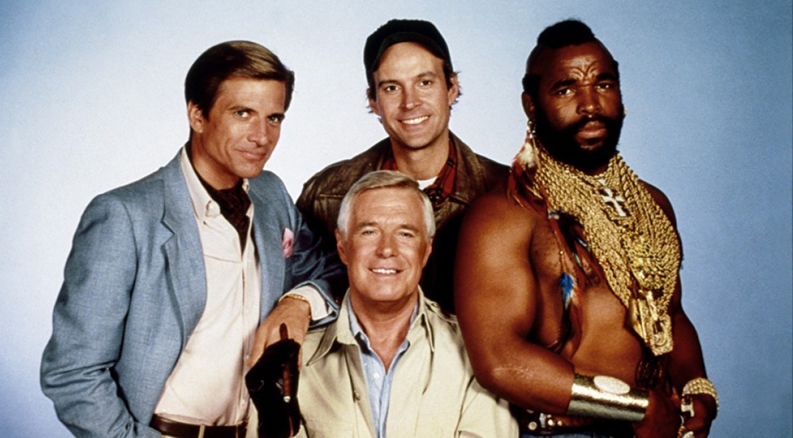There’s nothing like revisiting a TV show from your youth to discover exactly how much you’ve grown up in the intervening years. (Or how grown up you already were, if you’re one of the fortunate ones.) I have no idea who that child was who took such pleasure in the Dukes of Hazzard, whose heart used to leap like a deer at the sound of “Dixie” played on a car horn; the good-ol’-boy-hating adult of today wants nothing to do with him. And I strongly suspect the kid who willingly sat through those episodes of Silver Spoons was, in fact, an alien doppleganger sent to infiltrate Earth society by posing as a witless twelve year-old whose role models were dorks. Maybe he was just a kid too lazy to get off his ass and change the channel.
Whoever those strange alternate selves turn out to be, I do feel a strong kinship to the kid who watched The A-Team. I was thrown back into his presence on the occasion of TV Land’s A-Team Fandemonium Marathon: 48 hours of dummy bullets, exploding cars, and men soaring balletically through the air. Not to mention lousy acting, weak puns, preposterous celebrity cameos, and enough specimens of Geniune Eighties Hair to start a museum. It’s probably not a good idea to watch anything constantly for two straight days, and sitting in front of The A-Team for more than a few hours inflames the human demand for plausibility into a rage-fueled geyser. “How can Hannibal Smith possibly have an acting career when he’s a wanted fugitive?” you might find yourself demanding of your roommate, or girlfriend, or cat, or the wall. “Who actually thinks Face is that good-looking? How could any doctor with brains think that Murdock is really crazy? How many stupid machines are they going to build out of discarded freezer parts or old wheelbarrows? And why the fuck doesn’t anyone ever get killed?”
But why stop at rampant implausibility when you can add repitition? All tv shows rely on formula to a certain extent, but The A-Team is in a league—a sport—all its own. It established a formula in its first few episodes and stuck to it so rigidly one could easily imagine a software program capable of generating A-Team stories. (Oh look—someone already has.) And although every A-Team fan knows the routine, and since you probably wouldn’t be reading this if reams of gunplay and cheesy jokes aren’t your cup of tea, we nevertheless must revisit, briefly, the well-oiled engine that was an A-Team story. Continue reading

